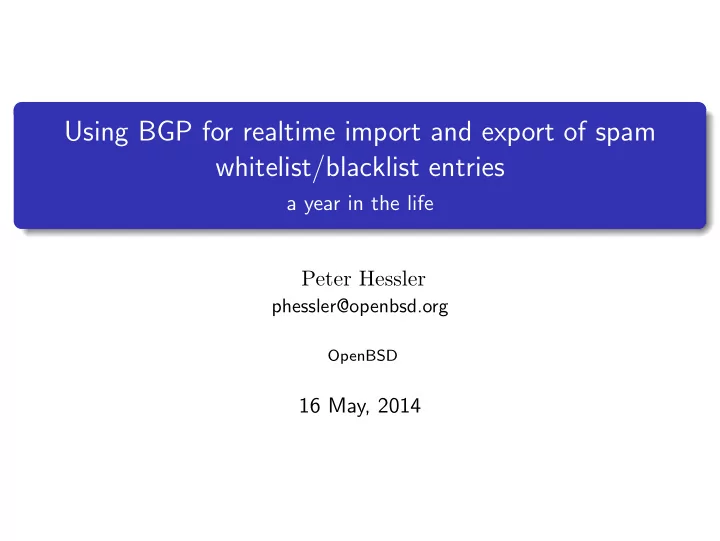

Using BGP for realtime import and export of spam whitelist/blacklist entries a year in the life Peter Hessler phessler@openbsd.org OpenBSD 16 May, 2014
bgp-spamd.net network-based spam fighting: bypass and trap lists from spamd(8) use BGP-4 and BGP communities (RFC 4271 & RFC 1997) for distribution and labeling
bgp-spamd.net Publically launched at AsiaBSDCon 2013 on March 17 3 upstream sources 4 users
bgp-spamd.net Today (16 May 2014) 5 upstream sources 28 users
bgp-spamd.net available at http://www.bgp-spamd.net all configurations and scripts are available I am interested in additional “spamd-source” servers, please contact me and of course, more users are always welcome
spamd-source only list the specific IP addresses that exhibited a specific behaviour do NOT penalize/reward network neighbors really simplistic, we just want to catch the low-hanging-fruit don’t open your mail server to the world don’t block the world from seeing your mail server greylisting is powerful, when it still applies!
spamd-source trap list generated from source server’s spamd trap list addresses are listed if their first delivery attempt is to a spamtrap expires in 24 hours from last delivery attempt
spamd-source bypass list spamd has a very low bar to be added to the whitelist ...redelivery within 4 hours ...kept in the whitelist for 36 days. semi-trusted email server list used to bypass spamd higher entry bar than normal spamd whitelist in the whitelist for 75 days, and sent more than 10 emails ...we “think” it’s a real mail server again, do not be overly aggressive
why is this useful use the bypass and trap lists from 3rd parties ...they are much larger than you ...semi-trusted servers are usually semi-trusted elsewhere ...ditto for attackers shared bypass lists help the “gmail sender” problem
statistics - also known as ’blatent lies’ 163,608,694 Events
statistics - also known as ’blatent lies’ for now, only IPv4 entries none! of the IPs can be aggregrated into non /32 netblocks 17,088 /24’s are represented in the bypass list 22,275 /24’s are represented in the traplist
traplist statistics - also known as ’blatent lies’ 1,174,783 unique addresses 31 entries with more than 10k announcements 10,346 entries with more than 1k announcements 801,001 entries announced only once
traplist statistics - also known as ’blatent lies’ Unique Unroutable IP Addresses 3 entries from 0.0.0.0/8 (’this’ network) 20 entries from 10.0.0.0/8 (RFC 1918) 1 entry from CGN Shared network 2 entries from localhost (127.0.0.0/8) 1 entry from 169.254.0.0/16 (link local) 7 entries from 172.16.0.0/12 (RFC 1918) 1 entry is 192.168.0.0/16 (RFC 1918) 15 entries are ”Multicast” (224.0.0.0/4) 17 entries are ”reserved” (240.0.0.0/4) total of 9849 additions
traplist statistics - also known as ’blatent lies’ Top 10 1 13,958 78.83.35.125/32 78-83-35-125.spectrumnet.bg. 2 13,735 39.53.191.193/32 ptcl.net.pk. 3 13,735 36.76.49.143/32 telin.co.id. 4 13,718 46.161.117.1/32 adsl-46-161-117001.crnagora.net. 5 13,625 79.29.46.11/32 host11-46-static.29-79-b.business.telecomitalia.it. 6 13,594 5.22.65.170/32 asiatech.ir. 7 13,573 84.54.160.128/32 bginfo.net. 8 13,559 2.182.8.116/32 dci.co.ir. 9 13,559 2.180.24.90/32 tci.ir. 10 13,486 81.169.146.190/32 mo4-p07-ob.smtp.rzone.de.
the good many sources sharing information block lists are supurb
the good 3rd parties are making this work with non-OpenBSD users! Mark Martinec made it work with FreeBSD, rbldnsd, and SpamAssassin Anonymous using Quagga and their Propritary infrastructure (thank you!)
the good very fast to update 7 seconds to download the full bypass and trap lists over crappy home dsl 2 seconds to propagate changes to all members ... can be even faster, needs more work
the bad bypass list has too many spammers on it ... several users have mentioned they had to stop using it ... we need to spend more time adjusting the heuristics
the bad server crash, causing 5 day outage ...while I was on vacation (in New Zealand) ...and during long holiday weekend
the ugly I have not been as responsive as I should have been have not had a lot of time to dedicate to improving ... code ... sources ... client usage
the ugly still no IPv6 support ... well, the distribution mechanism works perfectly fine ... “just” needs spamd(8) support
lessons learned overall, a success generally positive reactions from users
future work fix the heuristics for addition to the bypass list ... a bit *too* relaxed (still) add IPv6 support to spamd 36 hour days
future work - spamd-source easier processing of spamd(8) on spamd-source systems can spamd differentiate how it received the data more spamd-sources from different and new countries ... University students in CA do not send a lot of email to JP
future work - route-servers second route server in Europe more reliability over lossy networks
future work - brainstorming voting ... “two upstreams think an IP is X, then make it X” ... somewhat tricky, as BGP doesn’t support this deeper level of integration between bgpd and spamd ... partial syncs of spamd databases ... spamd use pf tables for all the things? ... for now, only thoughts with both upsides and downsides
Acknowledgements Many thanks to my coauthor Bob Beck, the University of Alberta at ualberta.ca Bob Beck of obtuse.com , Henning Brauer of bsws.de Peter N.M. Hansteen of BSDly.net , for being sources of spamdb information. Sonic.net for hosting the reference implementation rs.bgp-spamd.net
Questions?
Recommend
More recommend